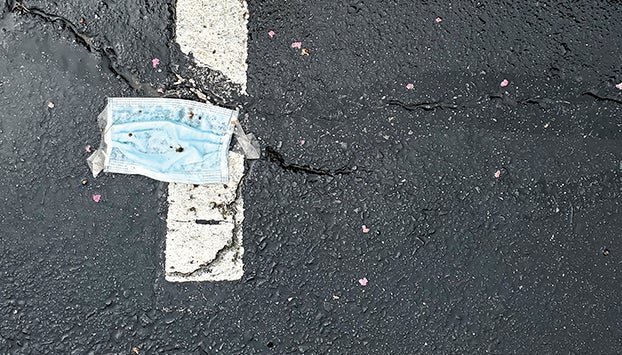Editorial: Put disposable masks in their place, too
Published 12:00 am Tuesday, August 11, 2020

- Josh Bergeron / Salisbury Post - A disposable mask that was discarded in a parking lot in Salisbury and became soggy after a rainy day last week.
These are divisive times in America, but there’s at least one thing around which we can unite.
For the love of any remaining litterless parking lots or streams, let’s all commit to not littering and, more specifically, putting disposable masks where they belong.
As masks and face coverings have become a necessary part of daily life, too many disposable masks are finding their final resting place anywhere except the correct trash receptacle.
At a grocery store, you might find them a few feet from the other plastic and paper peppering the parking lot. They’re also an occasional sight on local roadsides. But they pollute the environment just the same when not discarded properly. And they can find their ways into rivers and streams. Just like bits of plastic, marine life — whether they’re in in the Yadkin River, High Rock Lake or the ocean — might mistake masks for food. Masks also contribute to clogged storm drains, which need to be clear now more than ever to prevent flooding during pop-up summer storms.
At the moment, the best destination for disposable masks is in the trash can, says Rowan County Environmental Management Director Caleb Sinclair.
“It is important that disposable face coverings should be disposed of in a trash can within a lined container (trash bag),” Sinclair said.
Once full, those trash bags should be placed in curbside roll carts for removal by solid waste providers, he said.
And it’s not just masks for which a reminder is needed. The same is true for other protective items such as gloves and wipes: Put them in a closed trash receptacle.
“It is important during this COVID-19 environment that citizens make extra effort to keep our public spaces clean and free of these potentially contaminated items. Our staff works hard to improve the aesthetic along our Rowan County roadsides,” Sinclair said.
In just the second quarter of the year, Environmental Management staff removed 39.10 tons of debris. Sinclair said staff has noticed masks as increasingly among litter.
To be clear, disposable masks should not be reused, which causes the litter dilemma in the first place. So, to avoid the problem entirely, a good solution is to choose reusable cloth or fabric masks that can be washed.
Any number of clothing companies now sell masks for a few dollars. They can also be made easily — with or without sewing — using some basic materials. For instructions on how to do so, visit: cdc.gov/coronavirus/2019-ncov/prevent-getting-sick/how-to-make-cloth-face-covering.html.


